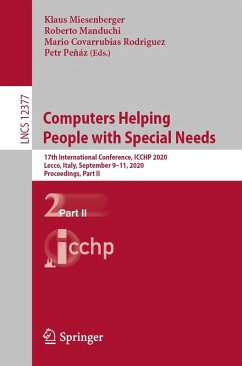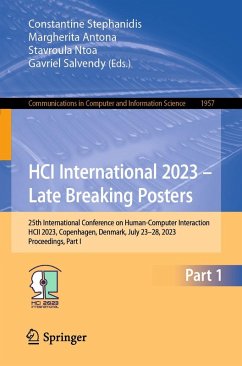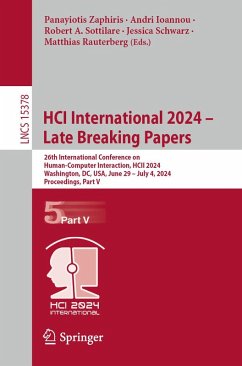
Encounters with HCI Pioneers (eBook, PDF)
A Personal History and Photo Journal
Versandkostenfrei!
Sofort per Download lieferbar
Statt: 58,84 €**
44,95 €
inkl. MwSt.
**Preis der gedruckten Ausgabe (Broschiertes Buch)
Alle Infos zum eBook verschenkenWeitere Ausgaben:

PAYBACK Punkte
22 °P sammeln!
The huge success of personal computing technologies has brought astonishing benefits to individuals, families, communities, businesses, and government, transforming human life, largely for the better. These democratizing transformations happened because a small group of researchers saw the opportunities to convert sophisticated computational tools into appealing personal devices offering valued services by way of easy-to-use interfaces. Along the way, there were challenges to their agenda of human-centered design by: (1) traditional computer scientists who were focused on computation rather th...
The huge success of personal computing technologies has brought astonishing benefits to individuals, families, communities, businesses, and government, transforming human life, largely for the better. These democratizing transformations happened because a small group of researchers saw the opportunities to convert sophisticated computational tools into appealing personal devices offering valued services by way of easy-to-use interfaces. Along the way, there were challenges to their agenda of human-centered design by: (1) traditional computer scientists who were focused on computation rather than people-oriented services and (2) those who sought to build anthropomorphic agents or robots based on excessively autonomous scenarios. The easy-to-learn and easy-to-use interfaces based on direct manipulation became the dominant form of interaction for more than six billion people.
This book gives my personal history of the intellectual arguments and the key personalities I encountered. I believe that the lessons of how the discipline of Human-Computer Interaction (HCI) and the profession of User Experience Design (UXD) were launched can guide others in forming new disciplines and professions. The stories and photos of the 60 HCI pioneers, engaged in discussions and presentations, capture the human drama of collaboration and competition that invigorated the encounters among these bold, creative, generous, and impassioned individuals.
This book gives my personal history of the intellectual arguments and the key personalities I encountered. I believe that the lessons of how the discipline of Human-Computer Interaction (HCI) and the profession of User Experience Design (UXD) were launched can guide others in forming new disciplines and professions. The stories and photos of the 60 HCI pioneers, engaged in discussions and presentations, capture the human drama of collaboration and competition that invigorated the encounters among these bold, creative, generous, and impassioned individuals.
Dieser Download kann aus rechtlichen Gründen nur mit Rechnungsadresse in A, B, BG, CY, CZ, D, DK, EW, E, FIN, F, GR, HR, H, IRL, I, LT, L, LR, M, NL, PL, P, R, S, SLO, SK ausgeliefert werden.












